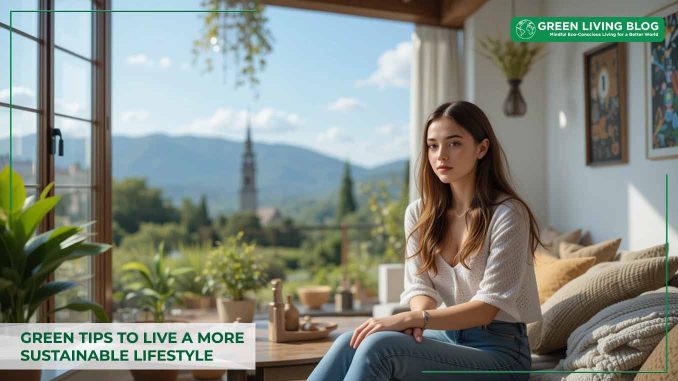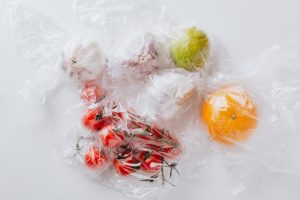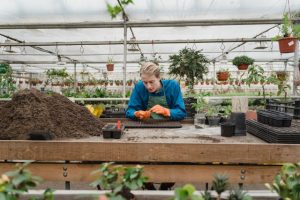
Sustainability tends to sound like a big, complicated thing – something that only governments and big corporations can tackle. But the truth is, the little choices we make every day add up and can have a real impact.
And here’s the thing: going green doesn’t mean turning your life upside down or making drastic changes you can’t stick to. It’s all about tweaking your daily habits in small, manageable ways that make a difference over time.
So, if you’re looking to live a little greener without the overwhelm, here are 9 easy (and some not as easy) ways to get started:
1. Refrain From Using Single-Use Plastics

Plastic is everywhere, from the soda bottle you grab at the convenience store to the straw that comes with your morning coffee. But these single-use plastics are a major burden on the environment, taking hundreds of years to decompose and often ending up in our oceans and harming marine life.
Instead, you can swap these items for their reusable alternatives like stainless steel bottles, beeswax wraps, and cloth shopping bags. A single reusable bottle, for example, can replace 1,500 plastic bottles per year!
2. Declutter and Store Responsibly

Excess consumption doesn’t clog up your floor space – it also leads to more waste. More waste in your local landfill means higher methane and greenhouse gas emissions, fueling climate change and environmental damage. It’s a cycle that keeps repeating.
So before buying something new, ask yourself: Do I really need it? If you do, make sure to donate, sell, or recycle old items instead of simply throwing them away. Alternatively, you can store them in a local storage facility rather than letting them go to waste. Self-storage in London, for example, offers unit sizes ranging from 10 to 200 square feet, allowing you to declutter your home while making an environmentally responsible choice.
3. Reduce Food Waste

Food waste contributes to 30-40% of landfill waste. That’s nearly half of all our waste! To help reduce this, plan your meals and only buy what you need. Here are a few tips:
- Plan your meals to avoid overbuying.
- Use leftovers creatively to minimise waste.
- Compost scraps instead of throwing them away.
While it’s a bit of a burden at worst, it becomes fairly routine after a while. And it can save you hundreds of dollars per year!
4. Shop with Sustainably in Mind

Shopping sustainably basically means you’re opting for brands or products that are environmentally friendly. For example, instead of purchasing from a company that produces a lot of waste, you opt for one that follows zero-waste practices. Instead of buying products packaged in single-use plastic, you choose ones with eco-friendly packaging options like paper or glass.
Sustainable shopping doesn’t have to be expensive – in fact, it can often save you money. There are many budget-friendly alternatives available such as:
- Shopping second-hand instead of buying new clothes.
- Buying from local farmers markets, reducing carbon emissions from transportation.
- Opting for natural and organic products that are better for the environment and your health.
5. Grow Your Own Food (You Don’t Need a Garden!)

Think growing your own food is only for those with big yards or expert gardening skills? Think again! There are plenty of ways to grow fresh produce in small spaces—or even indoors.
Even without a garden, small herb pots, window planters, or a balcony garden can help you cut down on store-bought produce wrapped in plastic. Homegrown food is fresher, reduces transport emissions, and supports a more self-sufficient lifestyle. Plus, it’s incredibly satisfying to pick ingredients straight from your own plants!
6. Eat a More Plant-Based Diet

No, we’re not asking you to ditch all meat from your diet completely. But you can incorporate some plant-based meals into your weekly menu. Eating more plant-based meals is not only better for the environment, but it can also have a positive impact on your health. These often include more fruits and vegetables, whole grains, and protein sources like beans, legumes, and nuts.
To start, try out some simple meatless recipes or gradually increase the number of vegetarian meals you cook each week. Not only will it benefit the planet, but it can also introduce you to new and delicious food options!
If you do want to transition to a plant-based diet completely, know that it can reduce your carbon footprint by 73%! Not a bad incentive to give it a try.
7. Use Alternative Modes of Transportation

Transportation contributes heavily to air pollution and greenhouse gas emissions. While cars are often seen as the most convenient mode of transportation, there are plenty of other alternatives out there.
Walking or biking for short distances is not only better for the environment, but it’s also great for your health. Public transportation, carpooling, and electric vehicles are also options to consider. If you do have to drive, make sure your car is well-maintained and opt for fuel-efficient models.
8. Conserve Energy at Home

Reducing energy consumption is one of the easiest ways to live more sustainably while also cutting down on utility costs. Start by switching to LED bulbs, which use 80% less energy and last much longer than traditional bulbs.
Another common issue is a phantom energy drain, where devices continue to use electricity even when turned off. To combat this:
- Unplug chargers, small appliances, and electronics when not in use.
- Use smart power strips that automatically cut off power to devices.
Laundry is another area where energy can be conserved. Wash clothes in cold water and consider air drying instead of using a dryer.
9. Save Water While You’re At It

Like energy, water is a valuable resource that we often take for granted. When we use too much water, we not only waste it but also contribute to the energy needed to treat and transport it. Here are some ways to save water:
- Fix leaky faucets and toilets.
- Install low-flow showerheads and faucet aerators.
- Collect rainwater for watering plants.
- Don’t leave the tap running while brushing your teeth or washing dishes.
By incorporating these habits into your routine, you can help preserve this vital resource while also lowering your water bills.
10. Ditch the Paper Once and For All

Paper production is a major contributor to deforestation and greenhouse gas emissions. This is because trees absorb carbon dioxide and release oxygen, helping to regulate our climate. When we cut down trees for paper production, we not only lose these important carbon sinks, but the production process also releases harmful emissions.
To reduce your paper consumption:
- Opt for digital billing and statements instead of paper mail.
- Use note-taking apps or reusable notebooks instead of traditional paper notebooks.
- Switch to e-books or audiobooks when possible.
- Decline printed receipts or request email versions instead.
You’ll quickly find that going paperless helps the environment, declutters your space, and reduces waste.
Final Thoughts
Rather than trying to implement all the tips above, opt for one or two to start with and gradually incorporate more into your daily routine. And even if you don’t move as you go on, you’re still doing enough to make a change.
Just remember, small actions can have a big impact when it comes to protecting our planet. By being mindful of our water and paper usage, we can all contribute to creating a more sustainable future for ourselves and generations to come.
![]()
Author Profile

- Eco Warrior by day, Eco Blogger by night trying to get the eco balance right.
Latest entries
 Green Home GuidesApril 17, 2025How Heat Pumps Help Cut Household Carbon Emissions
Green Home GuidesApril 17, 2025How Heat Pumps Help Cut Household Carbon Emissions EnvironmentApril 17, 20256 Benefits of Wall Cladding for Eco-Friendly Renovations
EnvironmentApril 17, 20256 Benefits of Wall Cladding for Eco-Friendly Renovations EnvironmentMarch 31, 20255 Sustainable Materials for Building Your Dream Eco-Friendly Pergola
EnvironmentMarch 31, 20255 Sustainable Materials for Building Your Dream Eco-Friendly Pergola Best practicesMarch 25, 202510 Green Tips to Live a More Sustainable Lifestyle
Best practicesMarch 25, 202510 Green Tips to Live a More Sustainable Lifestyle





Leave a Reply
You must be logged in to post a comment.